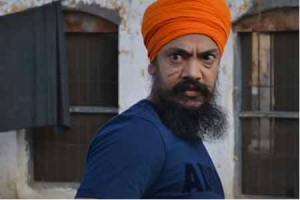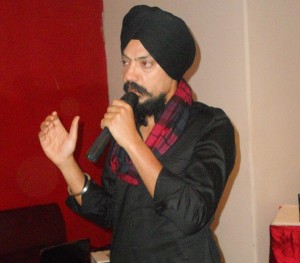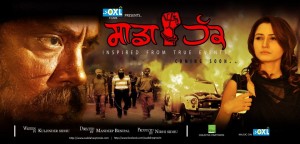Articles/Opinion
Sadda Haq: Film Producer Kuljinder Sidhu says ‘Film is an emotional and action type of Drama’
March 31, 2013 | By Editor
by Indira Prahst*
GLOBALLY, there has been a wave of interest in the film Sadda Haq which will be released next week on April 5 all around the world. It will also be screened locally in Surrey. The Canadian Sikh Coalition (CSC) has secured the distribution rights to the film. What has raised eyebrows is the fact that the movie was banned by India’s Central Board of Film Certification (CBFC), but was cleared by the Film Certification Appellate Tribunal (FCAT).
According to CSC and others, the film is based on the events in the 1980s and 1990s in Punjab, the period of armed Sikh struggle. Many important and specific episodes of the period are depicted in the movie. They include human rights activist Jaswant Singh Khalra’s murder, police torture and fake encounters, jail break, and the assassination of a politician responsible for unleashing region of terror on the people of Punjab.
Film producer Kuljinder Sidhu (see photo) this week told me from India that the film aims to shed light on the misperceptions about the militant time period in Punjab. He noted: “The Indian government has projected that it is a law and order problem but we have projected that it was a political issue. (Sikhs) in Punjab had genuine demands (in preserving) their heritage and history. They (the Indian state) created such a situation that many Sikh youngsters took up arms against their own government. This is what created the movement.”
Sidhu said this film was based on historical facts, and I find it is one of many pieces to the puzzle which I have encountered in my own academic work about that period and the Khalistan movement.
When I asked him what in particular he wanted to highlight in the film that would add to the knowledge base about militancy in Punjab, he said that he included historical facts such as that of Jaswant Singh Khalra to show not only that human rights activists had been killed by police but also how this was done. He added: “We showed what was happening in the police stations at that time. There are many examples such as fake encounters, no security, how innocent Sikhs were killed [not only] by police, but by militants also. I have shown what the sentiments and emotions were at the time. So the film is an emotional and action type of drama with about 95 percent of scenes inspired from actual characters and actual events in Punjab at that time.”
Some of the sentiments and impressions in the film cannot be separated from the filmmaker’s own lived experiences. When I asked Sidhu how he is personally connected to the content of the film, he told me that his father was a journalist in Amritsar which was the most troubled area at that time and he was only 10 years old when the Indian Army invaded the Golden Temple.
He said: “I have memories of that time. When I was in college, I saw so many youngsters who were involved in the movement. Whatever they were doing, it was for their community and freedom of their community. I have suffered and observed so many things on my own. … So all those impressions were there in my mind and now I made [some of it] it into a film.”
THE film centres on two generations, one which belongs to the militants, and the other of the younger generation. In the latter case, the film portrays a PhD student who goes to Punjab and the emotions that are evoked as she explores the militant past. There is also another character who wanted to be a national hockey player, but circumstances pushed him in other directions, said Sidhu. The characters and their struggles are presented in such a way that people can relate to them in their own way.
For this reason, the topic is one of interest to many Sikhs and as such, the overwhelming support that the film has received in Canada so far does not surprise me at all. This desire to know was often a subject in my speeches on sovereignty and that the “spirit of Khalistan” is alive, which was evident during the global movement for Balwant Singh Rajoana (who was convicted in the assassination of former Punjab chief minister Beant Singh in 1995) last March when here in B.C. also thousands of Sikhs stood in solidarity in front of the Vancouver Art Gallery. A few years ago, when I was in Amritsar, one Sikh youth told me that a Sikh homeland is “deep in their hearts,” but they suppress this desire.
On that note, I asked Sidhu whether the film encourages advocacy for Khalistan. He said: “This is not a pro-Khalistan film. It talks about the reason behind Punjab militancy.” I asked him if it would be a problem for him if the film was seen as advocating for Khalistan, he replied; “I don’t think so because as far as the Indian parliament and Supreme Court are concerned, you can demand [creation of Khalistan] in a peaceful manner. The film may convey that feeling indirectly. I don’t think it can create a problem, but you never know.”
AS mentioned above, the movie was banned by India’s CBFC, but was cleared by the FCAT. Explaining the process, he said that initially he was told that the “film is not meant for public education and could create problems in India which they (Indian Government) are trying to prevent.” However, given that the filmmakers had had proper consultation with a legal team, and with appeals that stated that “the content of the film was based on facts which they can prove,” they were finally cleared after making some minor changes. One change was that some of the characters in the film “looked too much like the real figure” involved in a bomb blast in which Beant Singh was killed – the case involving Rajoana.
Trying to understand the militant movement in Punjab is indeed a complex process. There is no doubt that the history of 1984 is a significant reference point for Sikhs on multifaceted levels. We are seeing a resistance unfolding on various fronts against historical representations and questioning of that time period. As such, films depicting historical facts can contribute to the knowledge base on the subject.
Time will tell what effect the film will have in informing Sikhs and the public at large about the militant movement in Punjab. While there are many perceptions about the question of truth, in this context I would add that truth is what we construct in our minds and facts aid in the process of reality construction.
* Chair, Department of Sociology and Anthropology,
& Race and Ethnic Relations Instructor,
Langara College.
.
Note: Above write-up was previously published by Asian Journal at source page: http://www.asianjournal.ca/mar%2029_13/ othead1.html. Visitors/Readers of Sikh Siyasat News (SSN) are advised to check the write-up on it’s source page also.
To Get Sikh Siyasat News Alerts via WhatsApp:
(1) Save Our WhatsApp Number 0091-855-606-7689 to your phone contacts; and
(2) Send us Your Name via WhatsApp. Click Here to Send WhatsApp Message Now.
Sikh Siyasat is on Telegram Now. Subscribe to our Telegram Channel
Related Topics: Indira Prasht, Punjabi Movies, Sadda Haq, Sikh News Canada








